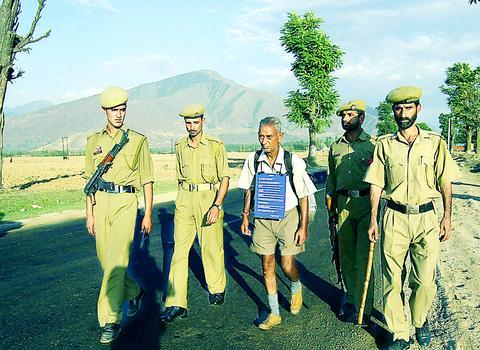Indian and Pakistani foreign ministers yesterday ended their first round of talks over Kashmir on a positive note, resolving to take forward the peace process, an official said.
"There is a commitment ... there is determination to take this process forward and make progress in whichever field we can," Indian foreign ministry spokesman Navtej Sarna told reporters.

PHOTO: AP
Sarna said Indian Foreign Minister Natwar Singh and Pakistani counterpart Khurshid Mahmud Kasuri had during their discussions in New Delhi tackled the explosive issue of Islamic militancy in the Indian zone of divided Kashmir.
India's concerns on the cross-border infiltration of Islamic rebels and what New Delhi calls the "infrastructure of terrorism" -- or militant training camps -- in the Pakistan-administered zone of Kashmir were discussed, he said.
"This is a matter of concern and it has been raised in all the meetings," Sarna said.
India accuses Pakistan of arming and training guerrillas in Kashmir, an allegation Islamabad denies although it openly offers diplomatic support to what it calls the Kashmiris' rightful struggle for self-expression.
More than 40,000 people have died in Indian Kashmir since the launch of the rebellion in 1989.
The foreign ministers also discussed a number of issues including a bus link connecting the two zones of Kashmir, Sarna said.
"Both ministers had a very long one-on-one meeting," he said, describing the talks between Kasuri and Singh as having taken place in a "friendly, cordial, affable and constructive atmosphere."
The meeting was a review of a series of meetings between bureaucrats of the two countries on a number of issues including trade, terrorism, drug trafficking and Kashmir between June and last month, Sarna said.
"This is an occasion to look forward to the engagement in terms of dialogue between the two countries in whatever form is coming up ahead," Sarna added.
The foreign ministers wind up their talks today.
Kasuri was ready later yesterday to call on former Indian prime minister Atal Behari Vajpayee, who set the peace process in motion last April by extending a "hand of friendship" to Pakistan.
Kasuri was also to meet India's opposition leader Lal Krishna Advani and Kashmiri separatist leader Mirwaiz Umer Farooq before attending a dinner later yesterday hosted by Natwar Singh.
Today, he was to call on Indian Prime Minister Manmohan Singh and National Security Advisor J.N. Dixit besides attending the second round of the formal talks.
He is also due today to meet India's oil minister Mani Shankar Aiyar over lunch to discuss the future of a proposed US$3.5 billion pipeline designed to transfer gas from Iran to India through Pakistan.

MAKING WAVES: China’s maritime militia could become a nontraditional threat in war, clogging up shipping lanes to prevent US or Japanese intervention, a report said About 1,900 Chinese ships flying flags of convenience and fishing vessels that participated in China’s military exercises around Taiwan last month and in January last year have been listed for monitoring, Coast Guard Administration (CGA) Deputy Director-General Hsieh Ching-chin (謝慶欽) said yesterday. Following amendments to the Commercial Port Act (商港法) and the Law of Ships (船舶法) last month, the CGA can designate possible berthing areas or deny ports of call for vessels suspected of loitering around areas where undersea cables can be accessed, Oceans Affairs Council Minister Kuan Bi-ling (管碧玲) said. The list of suspected ships, originally 300, had risen to about

DAREDEVIL: Honnold said it had always been a dream of his to climb Taipei 101, while a Netflix producer said the skyscraper was ‘a real icon of this country’ US climber Alex Honnold yesterday took on Taiwan’s tallest building, becoming the first person to scale Taipei 101 without a rope, harness or safety net. Hundreds of spectators gathered at the base of the 101-story skyscraper to watch Honnold, 40, embark on his daredevil feat, which was also broadcast live on Netflix. Dressed in a red T-shirt and yellow custom-made climbing shoes, Honnold swiftly moved up the southeast face of the glass and steel building. At one point, he stepped onto a platform midway up to wave down at fans and onlookers who were taking photos. People watching from inside

Japan’s strategic alliance with the US would collapse if Tokyo were to turn away from a conflict in Taiwan, Japanese Prime Minister Sanae Takaichi said yesterday, but distanced herself from previous comments that suggested a possible military response in such an event. Takaichi expressed her latest views on a nationally broadcast TV program late on Monday, where an opposition party leader criticized her for igniting tensions with China with the earlier remarks. Ties between Japan and China have sunk to the worst level in years after Takaichi said in November that a hypothetical Chinese attack on Taiwan could bring about a Japanese

The WHO ignored early COVID-19 warnings from Taiwan, US Deputy Secretary of Health and Human Services Jim O’Neill said on Friday, as part of justification for Washington withdrawing from the global health body. US Secretary of State Marco Rubio on Thursday said that the US was pulling out of the UN agency, as it failed to fulfill its responsibilities during the COVID-19 pandemic. The WHO “ignored early COVID warnings from Taiwan in 2019 by pretending Taiwan did not exist, O’Neill wrote on X on Friday, Taiwan time. “It ignored rigorous science and promoted lockdowns.” The US will “continue international coordination on infectious